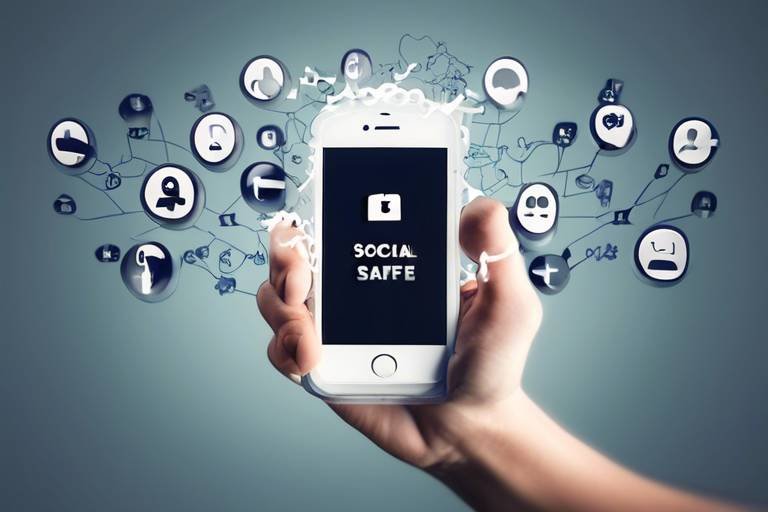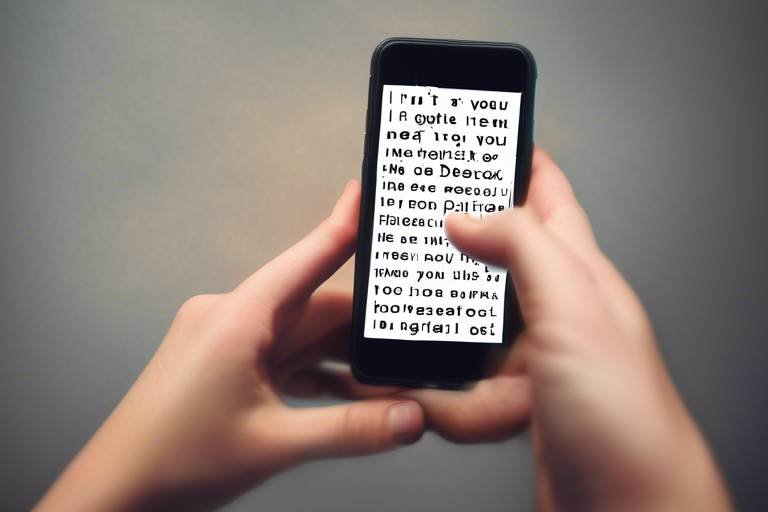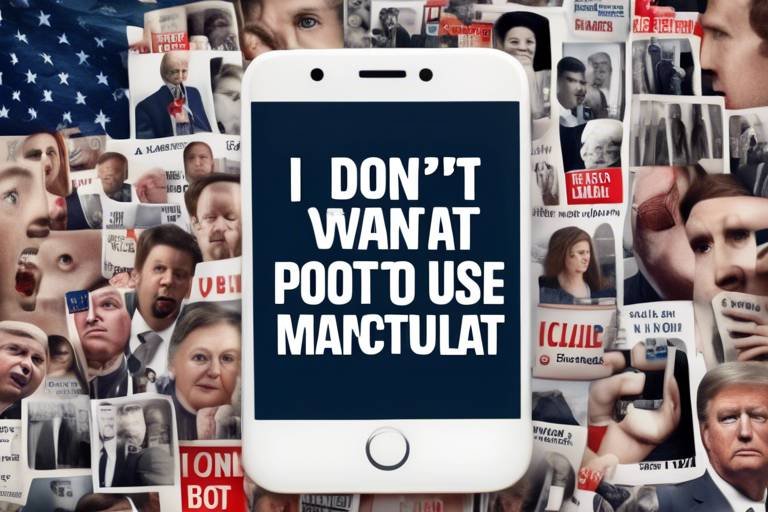How to Prevent Social Media from Ruining Your Relationships?
In today's fast-paced digital world, social media has become a double-edged sword, slicing through the fabric of our relationships. While it offers us the convenience of staying connected, it also poses a significant risk to the quality of our interactions. Have you ever found yourself scrolling through your feed instead of engaging in a meaningful conversation with your partner? You're not alone! Many people struggle to find the right balance between online interactions and real-life connections. The good news is that with a few effective strategies, you can prevent social media from undermining your relationships and instead use it to enhance your connections.
First, let’s understand the impact social media has on our relationships. It’s like a powerful magnet that draws us in, but it can also create distance if we’re not careful. Studies show that social media can shape our perceptions of others, often leading to misunderstandings and jealousy. For instance, seeing a friend’s vacation photos might spark envy, which can lead to feelings of inadequacy in your own life. This emotional rollercoaster can create a rift between you and your loved ones if not addressed. So, how can we navigate this tricky landscape?
One of the first steps is to set clear boundaries around social media use. Think of boundaries as the guardrails on a highway—they keep you on track and prevent you from veering off course. Discussing these boundaries with your partner or friends is crucial. It’s not about restricting freedom but rather about fostering a healthy environment for your relationships. For example, you might agree to limit social media usage during meals or designate specific times for checking updates. This way, you can prioritize face-to-face interactions and deepen your connections.
Moreover, it’s essential to communicate your expectations. Open and honest conversations about social media can help clarify what is acceptable and what isn’t. Are you okay with your partner posting pictures of your private moments? Would you prefer to keep certain aspects of your life off the grid? Discussing these topics can prevent misunderstandings and build trust. Remember, it’s all about being on the same page!
Another critical aspect is recognizing red flags that indicate social media is negatively affecting your relationship. Are you feeling more isolated despite being 'connected'? Do you find yourself comparing your life to others' highlight reels? These are signs that it might be time to reassess your social media habits. Addressing these concerns early can help prevent deeper issues from arising.
Encouraging offline activities is another excellent way to strengthen your relationships. Engaging in shared hobbies or planning regular date nights can create lasting memories and foster intimacy. Think of it as recharging your relationship battery—without those offline moments, it can quickly drain. Plus, participating in group activities can enhance social bonds, allowing you to connect with others in a meaningful way, reducing your reliance on digital interactions.
Finally, fostering open communication is vital. Creating a safe space for conversations about social media can promote honesty and understanding. Regular check-ins with your loved ones can help you stay connected and address any feelings or experiences related to social media. It’s like having a regular tune-up for your relationship—keeping everything running smoothly and addressing issues before they escalate.
In conclusion, while social media can be a powerful tool for connection, it’s essential to be mindful of its potential pitfalls. By setting boundaries, communicating openly, recognizing red flags, encouraging offline activities, and fostering honest conversations, you can prevent social media from ruining your relationships. Remember, it’s all about balance. So, unplug every once in a while, look into the eyes of the people you care about, and enjoy those beautiful moments together!
Q: How can I talk to my partner about social media boundaries?
A: Start by expressing your feelings and concerns, and invite them to share their thoughts. Approach the conversation with an open mind and a willingness to compromise.
Q: What are some signs that social media is affecting my relationship negatively?
A: Signs include increased jealousy, feeling disconnected despite online interactions, or prioritizing social media over in-person time with your partner.
Q: How can I encourage offline activities with my friends?
A: Suggest fun outings, like hiking, cooking together, or visiting a local event. The key is to make it enjoyable and create opportunities for bonding away from screens.

Understanding the Impact of Social Media
Social media has become an integral part of our daily lives, shaping how we communicate and perceive the world around us. It’s like a double-edged sword; on one hand, it connects us with friends, family, and even strangers who share our interests, but on the other hand, it can create misunderstandings, jealousy, and a false sense of intimacy. Have you ever found yourself feeling closer to someone online than you do in real life? This phenomenon is becoming increasingly common, and it can lead to a distorted view of relationships.
One of the biggest impacts of social media is the way it alters our perceptions of reality. When we scroll through curated feeds filled with perfectly edited photos and highlight reels of others’ lives, it’s easy to fall into the trap of comparison. You might start to question your own relationships, thinking, “Why aren’t we having as much fun as they are?” This can lead to feelings of inadequacy and resentment, which can poison even the strongest bonds.
Moreover, social media can ignite emotional responses that affect our connections. For instance, seeing an ex-partner post about their new relationship can trigger feelings of jealousy or sadness. This emotional rollercoaster can lead to conflicts with current partners, as they may not understand the underlying feelings that social media can evoke. A simple post can spiral into a full-blown argument if not addressed properly.
It's also important to recognize how social media influences communication styles. With the rise of emojis, memes, and shorthand texting, meaningful conversations can sometimes take a backseat. When was the last time you had a heart-to-heart talk with someone without the distraction of your phone? The immediacy of social media can lead to superficial interactions, leaving deeper issues unaddressed. In fact, studies show that couples who spend excessive time on social media report lower relationship satisfaction compared to those who engage in face-to-face conversations.
So, how do we navigate this complex landscape? It starts with understanding that while social media offers numerous benefits, it also poses significant challenges. Here are some key points to consider:
- Awareness: Recognize how social media affects your feelings and interactions.
- Mindful Usage: Be conscious of the time spent online and its impact on your relationships.
- Open Dialogue: Discuss social media’s role in your relationships with your loved ones.
In conclusion, the impact of social media on relationships is profound and multifaceted. By understanding its effects, we can take proactive steps to ensure that our online interactions enhance rather than hinder our connections. It’s all about finding that balance and making sure that our real-life relationships remain a priority. Remember, it’s not just about being connected online; it’s about being truly connected in life.
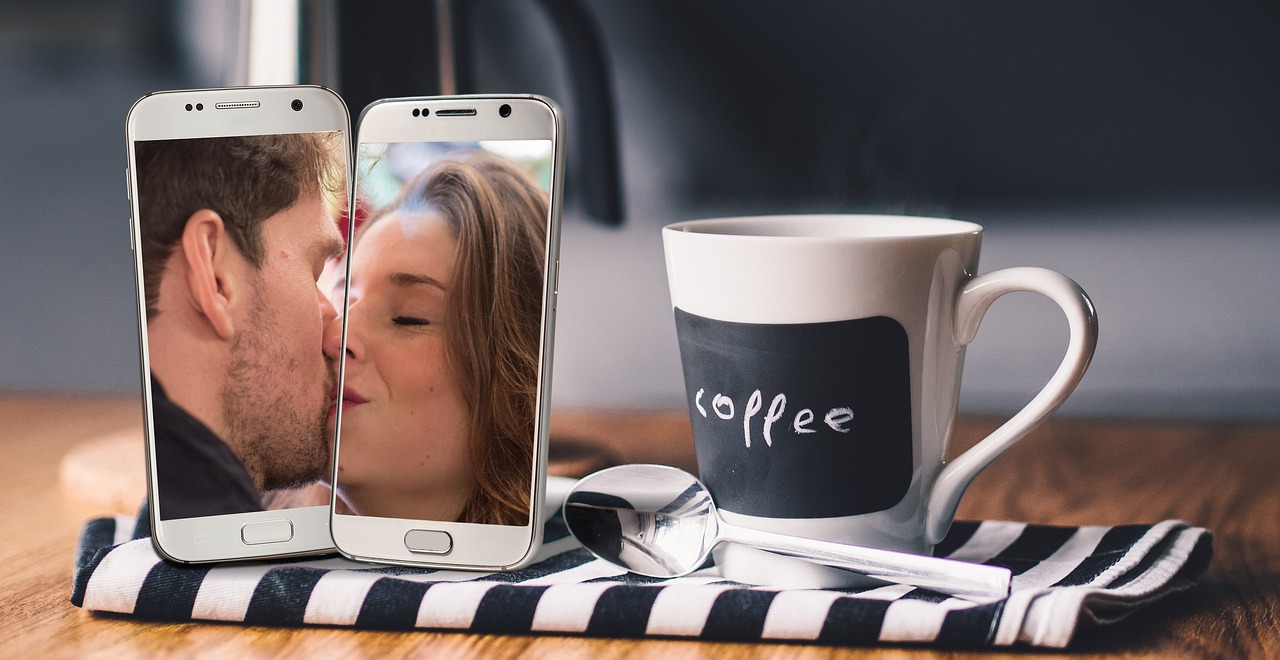
Setting Boundaries
In today's hyper-connected world, where social media is at our fingertips, establishing clear boundaries is essential for maintaining healthy relationships. Think of it like setting up a fence around your garden; it keeps the weeds out while allowing the flowers to bloom. Without these boundaries, it's all too easy for social media to intrude on your personal interactions, leading to misunderstandings and conflicts. So, how do we create these protective barriers while still enjoying the digital realm? Let's dive in.
First and foremost, it’s crucial to discuss your social media habits with your partner or friends. Communication is the cornerstone of any relationship, and this includes talking about your online presence. Have you ever felt ignored when your partner is scrolling through their feed during dinner? Or perhaps you’ve noticed that your friend seems more engaged with their phone than with you during outings? These are signs that it’s time to address your social media usage. When setting boundaries, consider discussing the following:
- How much time you spend on social media: Agree on limits to ensure that online interactions don’t overshadow face-to-face conversations.
- What to share publicly: Talk about privacy settings and what personal moments are okay to share online.
- When to unplug: Set specific times for social media use, especially during meals or quality time.
Next, let’s talk about privacy concerns, which can be a significant source of tension in relationships. Have you ever felt uneasy about what your partner posts on social media? Or maybe you’re uncomfortable with the idea of your private life becoming public? Discussing these feelings openly can help foster trust and security. Make it a point to talk about your privacy settings and what you both consider acceptable to share. This dialogue not only strengthens your bond but also sets a precedent for mutual respect.
Lastly, agreeing on social media time can be a game-changer. In a world where notifications constantly tug at our attention, it’s vital to carve out moments for genuine connection. Consider establishing a social media-free zone during certain times of the day, like during meals or before bed. This allows you to focus entirely on each other, creating a more profound emotional connection. Remember, the goal is to enhance your relationship, not let social media dictate it.
In summary, setting boundaries around social media use is not just about limiting screen time; it’s about fostering a deeper connection with the people you care about. By communicating your needs, discussing privacy, and agreeing on social media time, you can create a harmonious balance between your online and offline lives. After all, the best relationships thrive in the real world, where genuine connections are made, not just likes and shares.

Communicating Expectations
When it comes to maintaining healthy relationships in a world dominated by social media, clear communication is absolutely vital. Just like you wouldn’t start a road trip without a map, entering a relationship without discussing your expectations can lead to misunderstandings and conflicts. So, how do you effectively communicate your needs? Start by having an open and honest conversation with your partner or friends about what social media means to you and how it fits into your relationship.
Begin by expressing your feelings regarding social media use. For instance, if you find yourself feeling neglected when your partner spends hours scrolling through their feed, it’s essential to share that emotion. Use “I” statements to avoid sounding accusatory. You might say, “I feel a bit distant when we’re both on our phones instead of talking.” This approach invites dialogue rather than defensiveness, allowing your loved ones to understand your perspective without feeling attacked.
Next, it’s crucial to outline your expectations clearly. This is where you can discuss what is acceptable and what isn’t when it comes to social media interactions. Consider discussing the following points:
- Frequency of Use: How often do you both check social media during your time together?
- Sharing Content: Are there certain things you prefer to keep private, or is everything fair game for posting?
- Interactions with Others: What are your feelings about liking or commenting on posts from exes or close friends?
Additionally, setting specific guidelines can help prevent future conflicts. For example, you might agree to limit social media use during meals or designate certain times of the day as “phone-free.” This not only strengthens your connection but also ensures that both parties feel valued and heard.
Lastly, remember that expectations can evolve over time. What works today might not work tomorrow. Therefore, it’s important to have regular check-ins to reassess your social media boundaries and expectations. This ongoing conversation fosters a deeper understanding and helps both partners feel more secure in their relationship.
In summary, communicating expectations about social media isn’t just about laying down the law; it’s about creating a shared understanding that enhances your connection. By being open, honest, and willing to listen, you can navigate the complex world of social media while keeping your relationships strong and fulfilling.

Discussing Privacy Concerns
In today's digital age, privacy concerns in relationships have become more pronounced than ever. With social media platforms constantly evolving, it’s crucial to have open discussions about what privacy means for you and your partner. After all, sharing personal moments online can be a double-edged sword. On one hand, it allows for connection and sharing; on the other, it can lead to misunderstandings and feelings of insecurity if not handled properly.
Start by considering the importance of transparency. Discuss what you both feel comfortable sharing on your profiles, and what should remain private. It’s not just about what you post but also about how you interact with each other online. For instance, do you feel okay with your partner liking or commenting on others' posts? Or does it make you feel uneasy? These are essential questions to address.
Another significant aspect of privacy is the settings on social media platforms. Many people are unaware of the various privacy settings available to them. Take the time to go through these settings together. Discuss who can see your posts, who can send you friend requests, and how your information is shared. This collaborative approach not only fosters trust but also ensures that both of you are on the same page regarding your online presence.
Moreover, consider creating a shared understanding of what constitutes oversharing. This can vary greatly between individuals. For example, some may feel comfortable sharing their relationship milestones publicly, while others might prefer to keep those moments intimate. Establishing these boundaries can prevent potential conflicts and misunderstandings down the line.
Lastly, remember that the discussion about privacy should be an ongoing dialogue. As your relationship evolves, so too will your comfort levels regarding social media. Regular check-ins can help ensure that both partners feel secure and respected. By fostering an atmosphere of openness, you can navigate the complexities of social media together, ensuring that it enhances rather than hinders your relationship.
- What should I do if my partner overshares on social media?
Communicate openly about your feelings. Share why it makes you uncomfortable and discuss potential boundaries.
- How can we ensure our privacy settings are adequate?
Take the time to review privacy settings together on each platform. Regularly update these settings as needed.
- Is it okay to have different privacy preferences in a relationship?
Absolutely! It’s essential to respect each other’s boundaries and find a compromise that works for both of you.
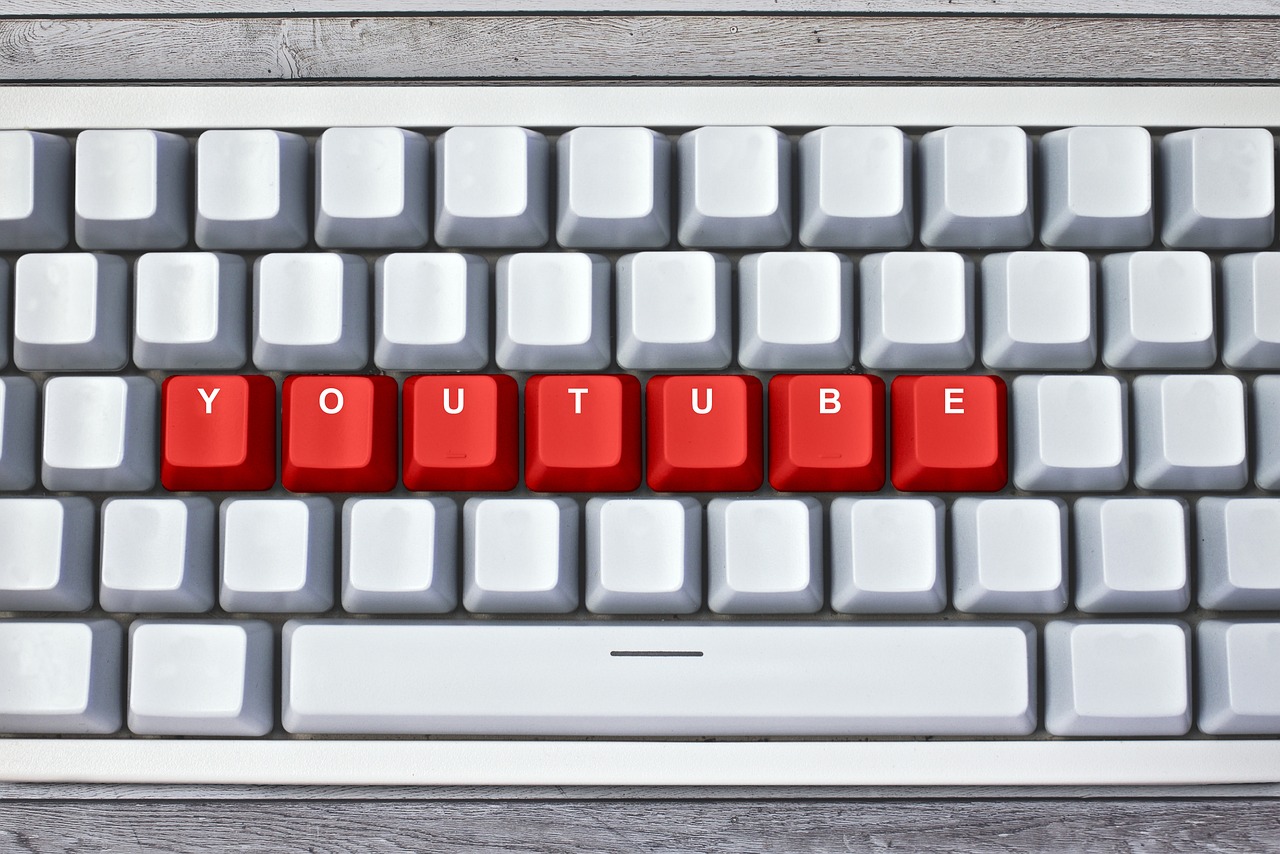
Agreeing on Social Media Time
In today's fast-paced digital world, finding a balance between online engagement and real-life interactions is more important than ever. Agreeing on social media time with your partner or friends can be a game-changer for your relationships. Think of it like setting the rules for a game: without clear guidelines, things can quickly spiral out of control. So, how do you establish these boundaries while ensuring everyone feels respected and valued?
First, it’s essential to have an open conversation about how much time you both spend on social media. This isn't about blaming each other but rather understanding each other's habits. You might say something like, "I've noticed we both spend a lot of time scrolling through our feeds. What do you think about setting some time limits?" This approach shows that you’re interested in their perspective and are looking for a mutual solution.
One effective strategy is to create a social media schedule. This could look something like this:
| Day | Social Media Time | Real-Life Interaction |
|---|---|---|
| Monday | 1 hour | Dinner together |
| Wednesday | 1 hour | Game night |
| Friday | 1 hour | Date night |
This table is just a starting point. You can adjust the times and activities based on what works best for both of you. The key is to ensure that social media does not overshadow your valuable face-to-face time.
Another helpful tactic is to designate "no phone zones" during specific activities. For example, you might agree to put your phones away during meals or while watching a movie together. This simple act can create a more intimate atmosphere and allow for deeper conversations. Remember, the goal is to enhance your connection, not to eliminate social media entirely. Social media can be fun and a great way to stay connected with others, but it shouldn’t come at the expense of your most important relationships.
Finally, it’s crucial to check in with each other regularly about how the agreed-upon social media time is working. Are you both feeling satisfied with the balance? Are there any adjustments that need to be made? Keeping the lines of communication open will help ensure that both partners feel heard and valued. Just like any relationship, flexibility and understanding are key!
- How do I talk to my partner about social media use? Start with an open and honest conversation, focusing on how you both feel about your current social media habits.
- What if my partner doesn't want to limit social media time? Discuss the importance of balance and how it can improve your relationship. Try to find common ground.
- How can we make our offline time more engaging? Plan fun activities together, like hiking, cooking, or even trying out a new restaurant.

Recognizing Red Flags
In the whirlwind of likes, shares, and comments, it’s easy to overlook the subtle signs that social media might be wreaking havoc on your relationships. But just like a canary in a coal mine, these red flags can signal deeper issues that need addressing. So, how do you know when your online interactions are crossing the line into unhealthy territory? Here are some key indicators to watch for:
First and foremost, if you find yourself feeling insecure or jealous after scrolling through your partner’s or friends' social media, it’s time to take a step back. These feelings can stem from comparing your relationship to the curated images and posts of others. Remember, what you see online is often a highlight reel, not the whole story. If you’re constantly questioning your worth or the strength of your relationship based on what you see online, that’s a significant red flag.
Another warning sign is if social media usage is causing frequent arguments. If you and your partner are bickering over time spent online or disagreements about what’s appropriate to post, it’s crucial to address these issues head-on. Communication is key, and if social media is becoming a recurring topic of conflict, it may be time to reevaluate your digital habits.
Additionally, consider how much time you and your loved ones are spending on social media. If you notice that your online interactions are taking precedence over face-to-face conversations, it’s a clear indication that something needs to change. Relationships thrive on quality time, and if social media is stealing that time away, it can create a chasm between you and your loved ones.
It’s also essential to recognize if social media is becoming a substitute for real-life interactions. If you find yourself feeling more connected to your online friends than those in your immediate circle, that’s a red flag. Relationships should be nurtured through direct communication and shared experiences, not just through digital screens.
Lastly, if you notice that you or your partner are engaging in secretive behavior regarding social media, such as hiding messages or being defensive about online interactions, this can erode trust. Healthy relationships are built on transparency and honesty, and if social media is breeding secrecy, it’s a sign that something needs to be addressed.
Recognizing these red flags is the first step towards taking control of your social media habits and ensuring they don’t undermine your relationships. By being aware of these signs, you can initiate conversations that lead to healthier boundaries and stronger connections.
- How can I talk to my partner about social media boundaries? Start with an open and honest conversation, expressing your feelings and concerns without blaming them. Use "I" statements to share your perspective.
- What should I do if I notice red flags in my relationship? Address them directly with your partner. Discuss your feelings and work together to find solutions that prioritize your relationship.
- Are there activities we can do to reduce social media usage? Absolutely! Plan offline activities like hiking, cooking, or game nights to reconnect without the distraction of social media.
- How can I ensure my social media use is healthy? Set specific times for social media use, prioritize face-to-face interactions, and regularly assess how your online presence affects your emotions and relationships.

Encouraging Offline Activities
In a world where our fingers are constantly scrolling through feeds and notifications are just a tap away, it’s easy to forget the magic of real-life connections. **Encouraging offline activities** is not just a suggestion; it’s a necessity for nurturing our relationships in this digital age. Think of your relationship like a garden: it needs sunlight, water, and care to flourish. If you only focus on the digital weeds, the beautiful flowers of your connection may wither away. So, how can we cultivate this garden? Let's explore some engaging offline activities that can help strengthen your bonds.
First and foremost, regular date nights are a fantastic way to reconnect with your partner or friends. Imagine planning an evening where the only notifications you receive are from each other! Whether it’s a cozy dinner at a new restaurant, a movie night at home, or a spontaneous road trip, the goal is to prioritize quality time together. You might even consider creating a date night jar, filled with fun ideas that you can draw from whenever you need inspiration. This not only adds an element of surprise but also ensures that you’re consistently making time for each other amidst the chaos of daily life.
Moreover, joining group activities can significantly enhance your social bonds. Think of it as a team sport for your relationships! Engaging in activities like joining a local sports league, attending a cooking class, or participating in community service can foster teamwork and camaraderie. These experiences allow you to create memories together that are far more enriching than a simple comment on a post. Plus, being part of a group can help you meet new people and expand your social circle, which can positively influence your existing relationships.
One of the best ways to encourage offline activities is to **explore hobbies together**. Whether it’s hiking, painting, or even gardening, sharing a hobby can deepen your connection. Hobbies provide a platform for collaboration and creativity, allowing you to learn from each other while having fun. Imagine the joy of planting seeds together and watching them grow, just like your relationship! This shared experience can lead to meaningful conversations and strengthen your emotional ties.
Lastly, consider scheduling regular family or friend gatherings. These can be as simple as a game night or a weekend barbecue. The key is to create a space where everyone feels comfortable and engaged. You might even set up a
| Date | Activity | Location |
|---|---|---|
| 1st Friday of the Month | Game Night | Home |
| 3rd Saturday of the Month | Outdoor BBQ | Park |
| Last Sunday of the Month | Movie Marathon | Home |
By encouraging offline activities, you’re not only creating opportunities for connection but also building a foundation of trust and intimacy. In a time when social media can sometimes feel like a barrier rather than a bridge, these activities can serve as a refreshing reminder of the joy of being present with one another. So, what’s stopping you? Grab your partner or friends, put down your phones, and dive into the wonderful world of offline experiences!
- Why are offline activities important for relationships?
Offline activities help strengthen bonds, improve communication, and create lasting memories that digital interactions often lack. - How can I encourage my partner to participate in offline activities?
Start small by suggesting a fun outing or hobby you both might enjoy. Emphasize the benefits of spending quality time together. - What if my friends prefer social media interactions?
Gently encourage them to join you in offline activities by highlighting the fun and connection that comes from face-to-face interactions.

Planning Regular Date Nights
In the whirlwind of daily life, it’s all too easy to let your relationship take a backseat, especially with the constant pull of social media. But, planning regular date nights can be a game changer! Think of it as hitting the "refresh" button on your connection. These dedicated times together allow you to focus on each other without the distractions of notifications or scrolling feeds. So, how do you go about making these date nights a regular occurrence?
First off, it’s essential to prioritize your time together. Just like you’d schedule a meeting at work, treat your date night with the same level of importance. This doesn't mean you need to plan extravagant outings every week; sometimes, the simplest activities can be the most meaningful. Whether it’s a cozy night in with your favorite movie or a stroll through the park, the key is to carve out that time for just the two of you.
Another great tip is to take turns planning the dates. This not only keeps things exciting but also allows each partner to share their interests. One week, you might surprise your partner with a cooking class, while the next week, they might take you to that new art exhibit you’ve been hearing about. This back-and-forth not only keeps the relationship fresh but also deepens your understanding of each other’s likes and dislikes.
Don’t forget to keep the conversation flowing during these date nights! Use this time to discuss your experiences, dreams, and even your feelings about social media and how it impacts your relationship. Maybe you can even make it a fun challenge to put your phones away for the night. Imagine the connection you’ll build when you’re not distracted by the outside world!
To help you get started, consider creating a date night calendar. This can be a simple table where you jot down your planned activities for the upcoming months. Here’s a quick example:
| Date | Activity | Who Plans It |
|---|---|---|
| October 15 | Candlelight Dinner at Home | Partner A |
| October 22 | Visit to the Local Museum | Partner B |
| October 29 | Hiking Adventure | Partner A |
By keeping this calendar visible, you’ll have a constant reminder of your commitment to each other. Plus, it adds an element of anticipation! You might even find yourselves looking forward to these nights more than you do to scrolling through your social media feeds.
In conclusion, planning regular date nights is not just an activity; it’s a commitment to nurturing your relationship. By prioritizing this time, communicating openly, and embracing spontaneity, you can create a stronger bond that withstands the challenges posed by social media. So, what are you waiting for? Start planning your next date night today!
- How often should we have date nights? Ideally, aim for at least once a week, but it can vary based on your schedule. The key is consistency!
- What if we can’t afford expensive outings? Date nights don’t have to be costly. Home-cooked meals, movie nights, or nature walks can be just as enjoyable.
- How do we handle disagreements during date nights? Approach disagreements with an open mind. Use date nights as a safe space to discuss feelings without distractions.

Joining Group Activities
Participating in group activities is an incredible way to enhance social bonds and create lasting memories with friends, family, or partners. Think about it: when was the last time you laughed so hard with a group of people that your stomach hurt? These moments are invaluable, and they often happen when we step away from our screens and engage with others in real life. Group activities not only foster a sense of belonging but also provide an opportunity to connect on a deeper level, away from the constant buzz of social media notifications.
Imagine you and your friends decide to take a cooking class together. Not only do you learn a new skill, but you also share laughter, frustrations, and triumphs as you navigate the kitchen. This shared experience strengthens your bond and gives you something to talk about long after the class is over. Plus, you can create a tradition out of it! Whether it’s cooking, hiking, or participating in a local sports league, the possibilities are endless. Here are some engaging group activity ideas:
- Outdoor Adventures: Plan a hiking trip or a day at the beach. Nature has a way of bringing people together.
- Game Nights: Host a board game night where everyone brings their favorite game. The competition can ignite fun and laughter.
- Volunteer Together: Find a local charity or organization where you can volunteer as a group. Helping others can strengthen your bond.
- Book Clubs: Start a book club where you can discuss literature and enjoy each other’s company over snacks.
These activities not only help you connect with one another but also reduce the reliance on social media for social interaction. When you’re engaged in a fun group activity, you’re less likely to be scrolling through your phone, and more likely to be present in the moment. This presence can lead to more meaningful conversations and a stronger emotional connection.
Moreover, joining group activities can also introduce you to new people, expanding your social circle. Each new connection can bring fresh perspectives and experiences, enriching your life and relationships. Think of it as planting seeds in a garden; each new friendship is a flower that can bloom into something beautiful.
In a world where social media can often lead to misunderstandings and isolation, embracing group activities can serve as a refreshing antidote. It’s about creating a balance—enjoying the digital world while also cherishing the richness of face-to-face interactions. So, gather your friends, family, or even acquaintances, and start planning your next group adventure. You never know how much fun you’ll have or how it might strengthen your relationships!
Q: How can I find group activities in my area?
A: Check local community boards, social media groups, or websites like Meetup.com to find activities that interest you.
Q: What if my friends are not interested in group activities?
A: Try suggesting different types of activities to gauge their interest. Sometimes, introducing a new idea can spark enthusiasm.
Q: How often should we engage in group activities?
A: Aim for at least once a month to keep the connection alive, but feel free to do more if everyone is on board!

Fostering Open Communication
Open communication is the lifeblood of any healthy relationship, and in the age of social media, it becomes even more crucial. When we think about the impact of digital interactions, it’s essential to recognize that the virtual world can sometimes create barriers rather than bridges. Have you ever sent a text and felt that it was misinterpreted? Or perhaps you’ve seen a post that made you question your partner's feelings? These scenarios highlight the necessity of fostering open dialogue about how social media affects our relationships.
To truly connect with our loved ones, we must be willing to discuss our feelings openly. This means creating an environment where both partners feel safe to express their concerns without fear of judgment. Imagine a cozy living room where you can sit down with your partner, free from distractions, and share your thoughts. That’s the kind of atmosphere you want to create. Establishing a safe space for conversations about social media can lead to deeper understanding and strengthened bonds.
One effective way to encourage open communication is by regularly checking in with each other. This could be as simple as asking, “How do you feel about our social media use lately?” or “Is there anything online that’s bothering you?” These questions can open the floodgates to meaningful discussions. It’s not just about addressing problems; it’s also about celebrating the positive aspects of your online interactions. For instance, if you both enjoy sharing memes or funny videos, take a moment to appreciate that connection.
Moreover, it’s vital to be mindful of how you communicate. Using “I” statements can be particularly effective. Instead of saying, “You’re always on your phone,” try, “I feel neglected when we’re together, and you’re focused on your phone.” This subtle shift in language can prevent defensiveness and promote a more productive conversation. Remember, the goal is to come together, not to point fingers.
In addition to verbal communication, consider also utilizing digital tools to foster connection. For example, you could create a shared document where both partners can jot down their feelings about social media interactions. This can serve as a conversation starter during your check-ins. It’s like having your own little diary that helps you navigate the complexities of your relationship in the digital age.
Ultimately, fostering open communication about social media is not just about addressing issues; it’s about building a stronger relationship foundation. By engaging in honest discussions, setting clear expectations, and being receptive to each other's feelings, you can navigate the digital landscape together. After all, your relationship is a partnership, and like any great team, you need to communicate effectively to succeed.
- Why is open communication important in relationships? Open communication fosters trust and understanding, essential elements for a strong relationship.
- How can I create a safe space for conversations? Ensure that both partners feel comfortable expressing their feelings without fear of judgment; choose a relaxed environment and approach discussions with empathy.
- What are “I” statements, and how do they help? “I” statements focus on your feelings rather than blaming the other person, which can lead to more productive conversations.
- How often should I check in with my partner about social media use? Regular check-ins can be beneficial, but the frequency should be based on your comfort level and the dynamics of your relationship.

Creating a Safe Space for Conversations
Creating a safe space for conversations about social media is essential for nurturing trust and openness in any relationship. Imagine this space as a cozy nook where both partners can share their thoughts without fear of judgment. It’s like having a secret garden where feelings can blossom, free from the harsh sunlight of criticism. To cultivate this environment, start by choosing a comfortable setting. Perhaps it’s your living room, a quiet café, or even a park bench—anywhere that feels inviting and relaxed.
Next, it’s crucial to establish a few ground rules before diving into discussions. These guidelines help maintain respect and understanding. For instance, agree to listen actively without interrupting, and avoid using accusatory language. Instead of saying, “You always spend too much time on your phone,” try framing it as, “I feel neglected when we’re both on our devices during dinner.” This subtle shift in language can make a world of difference.
In addition to setting the stage, consider these key elements to foster a safe space:
- Non-judgmental Listening: Make a conscious effort to listen without jumping to conclusions or forming responses while the other person is speaking.
- Empathy: Try to put yourself in your partner's shoes. Understanding their perspective can help bridge gaps and ease tensions.
- Regular Check-ins: Schedule regular times to discuss feelings about social media. This can prevent issues from piling up and becoming overwhelming.
Another effective strategy is to use “I” statements rather than “you” statements. This technique reduces defensiveness and encourages open dialogue. For example, saying “I feel anxious when I see you online late at night” is more constructive than “You’re always on your phone instead of paying attention to me.”
Lastly, remember that it’s okay to take breaks during these conversations. If emotions run high, suggest a short pause to collect thoughts. This can prevent misunderstandings and lead to a more productive discussion. By creating this safe space, you're not just addressing social media issues; you're strengthening the foundation of your relationship, allowing it to flourish.
Q1: How can I initiate a conversation about social media without causing conflict?
A1: Start by expressing your feelings rather than pointing fingers. Use “I” statements and choose a calm moment to discuss your concerns.
Q2: What if my partner is resistant to discussing social media?
A2: If they seem resistant, try to understand their perspective. Encourage them to share their feelings and emphasize that the goal is to improve your relationship.
Q3: How often should we check in about social media use?
A3: It depends on your relationship dynamics, but regular check-ins—perhaps once a week—can help maintain open communication and address any emerging issues.

Regular Check-ins with Loved Ones
In today's fast-paced world, where social media often takes center stage, it's easy to overlook the importance of regular check-ins with our loved ones. These moments of connection are essential for maintaining the emotional health of our relationships. Just like watering a plant, consistent attention helps it thrive. So, how can we effectively implement these check-ins?
First and foremost, it's important to create a routine that works for everyone involved. Whether it's a weekly coffee date, a phone call every Friday, or a simple text message to ask how their week is going, these small gestures can make a significant difference. Regular check-ins not only show that you care, but they also provide an opportunity to discuss feelings about social media and its impact on your relationship. You might be surprised at how much can be revealed during these candid conversations.
During these check-ins, consider asking open-ended questions that encourage meaningful dialogue. For instance:
- How do you feel about our social media interactions?
- Have you noticed any changes in how we communicate online?
- Is there anything you'd like to change about our social media habits?
These questions can help uncover underlying issues and ensure that both parties feel heard and understood. It's about fostering a safe space where both individuals can express their thoughts without fear of judgment. Remember, the goal is not to point fingers but to strengthen the bond you share.
Moreover, regular check-ins can serve as a reminder of the value of face-to-face interactions. While social media can enhance connectivity, it should never replace genuine human interaction. Use these moments to plan activities that pull you away from screens and into each other's company. Perhaps you could brainstorm new activities to do together, like exploring a new hobby or simply enjoying a walk in the park.
In summary, regular check-ins with loved ones are a powerful tool in maintaining healthy relationships in our socially connected yet often isolated world. By prioritizing these moments, we can ensure that our connections remain strong, vibrant, and fulfilling, even amidst the distractions of social media.
- How often should I check in with my loved ones? It depends on your relationship, but a good rule of thumb is to aim for at least once a week.
- What should I do if my loved one is unresponsive during check-ins? If someone is unresponsive, try to reach out again later or ask if there's a better time to talk.
- Can check-ins help improve my relationship? Absolutely! Regular communication can strengthen bonds and help address any issues before they escalate.
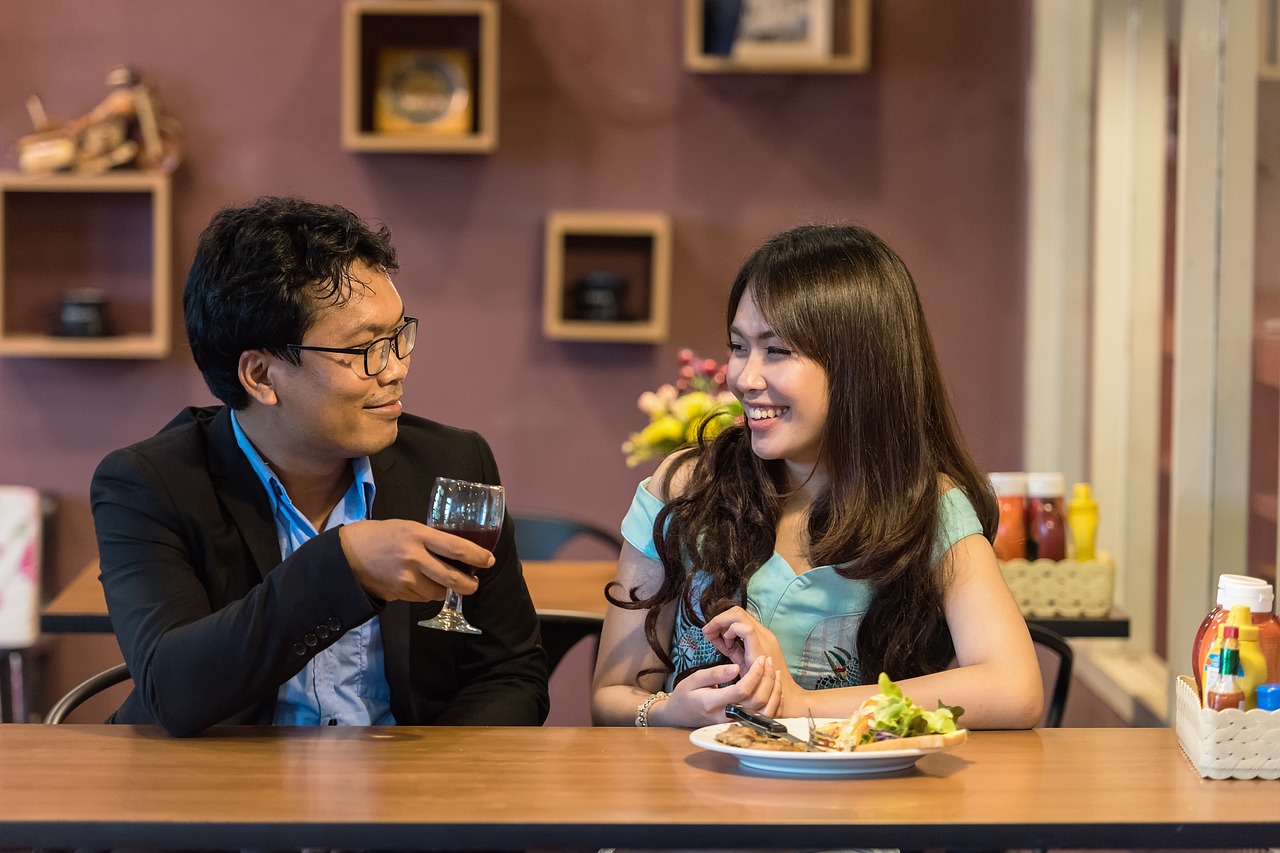
Seeking Professional Help
In today's fast-paced digital world, navigating the complexities of relationships can sometimes feel overwhelming, especially when social media is involved. If you find that your interactions with loved ones are increasingly strained due to online pressures, it may be time to consider seeking professional help. This doesn't mean your relationship is doomed; rather, it signifies a proactive step towards understanding and healing.
Therapists and counselors can provide invaluable support in addressing the unique challenges posed by social media. They can help you unpack feelings of jealousy, insecurity, or anxiety that might arise from social media interactions. By fostering a safe environment for discussion, professionals can guide you through your emotions, helping you articulate your needs and concerns more clearly.
Moreover, engaging with a professional can offer you tools and strategies to manage your social media use more effectively. For instance, they might suggest techniques to enhance your communication skills, enabling you to express your feelings without blame or defensiveness. This way, both partners can feel heard and understood, paving the way for healthier interactions.
When considering professional help, it's essential to find someone who understands the digital landscape and its impact on relationships. Look for therapists who specialize in relationship dynamics or digital wellness. A good therapist will not only address the symptoms but also help you explore the underlying issues that may be affecting your relationship. Here are a few things to keep in mind when seeking professional assistance:
- Research Credentials: Ensure that the therapist has the appropriate qualifications and experience in relationship counseling.
- Check Reviews: Look for testimonials or reviews from previous clients to gauge their effectiveness.
- Ask About Their Approach: Inquire whether they have specific strategies for dealing with social media-related challenges.
- Consider Compatibility: It's crucial to feel comfortable with your therapist to foster open and honest communication.
In some cases, couples therapy might be beneficial, allowing both partners to address their concerns in a structured environment. This approach can lead to deeper understanding and stronger bonds. Remember, seeking help is a sign of strength, not weakness. It's about taking charge of your relationship and ensuring that both you and your partner feel valued and connected.
Ultimately, don't hesitate to reach out for help when you feel overwhelmed. Professional guidance can be a transformative experience, offering you the insights and tools needed to navigate the tricky waters of social media and relationships. By investing in your relationship, you're not just preserving it; you're enhancing it, ensuring that both partners can thrive in a digital world that often complicates human connection.
1. How do I know if I need professional help for my relationship?
If you find that social media is causing ongoing conflict, feelings of jealousy, or communication breakdowns, it may be beneficial to seek professional guidance.
2. What should I look for in a therapist?
Look for someone with experience in relationship counseling and an understanding of the impact of social media on relationships. Reviews and credentials can help you assess their suitability.
3. Is couples therapy effective for social media issues?
Yes, couples therapy can provide a safe space for both partners to express their feelings and work through the challenges posed by social media.
4. How can I prepare for my first session with a therapist?
Consider jotting down your main concerns and any specific incidents related to social media that have affected your relationship. This will help you articulate your feelings during the session.
5. Can individual therapy help if my partner isn't interested in going?
Absolutely! Individual therapy can help you process your feelings, develop coping strategies, and improve your communication skills, which can ultimately benefit your relationship.
Frequently Asked Questions
-
How does social media affect my relationships?
Social media can have both positive and negative effects on relationships. On one hand, it allows for constant communication and connection with loved ones, but on the other hand, it can lead to misunderstandings, jealousy, and feelings of inadequacy. It's essential to be aware of how online interactions shape your perceptions and emotions.
-
What are some effective ways to set boundaries with social media?
Setting boundaries involves having open discussions with your partner or friends about your social media usage. You can agree on specific times for social media use, establish privacy settings, and communicate your expectations clearly. This ensures that digital interactions do not overshadow your real-life connections.
-
What red flags should I look for that indicate social media is harming my relationship?
Common red flags include excessive time spent on social media at the expense of quality time together, frequent arguments about online interactions, or feelings of insecurity stemming from what you see online. If you notice these signs, it’s important to address them openly with your partner.
-
How can I encourage offline activities with my partner or friends?
Planning regular date nights, engaging in hobbies together, or joining group activities can significantly strengthen your relationships. These offline interactions help create deeper connections and reduce reliance on social media for companionship.
-
Why is open communication important regarding social media?
Open communication fosters trust and understanding in relationships. Discussing feelings about social media allows you to express concerns and work together to find solutions. Creating a safe space for these conversations can lead to a healthier dynamic.
-
When should I consider seeking professional help for relationship issues related to social media?
If social media is causing significant distress in your relationship, such as recurring arguments or feelings of isolation, it may be time to seek professional help. A therapist can provide guidance and strategies to navigate these challenges effectively.



